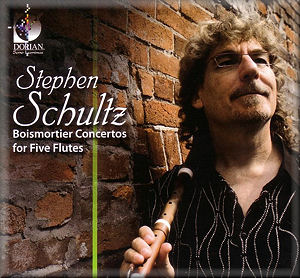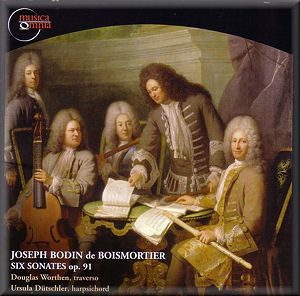 |
 |
| 

alternatively
CD: MDT
AmazonUK
AmazonUS |
Joseph BODIN DE BOISMORTIER
(1689-1755)
Concertos for five transverse flutes op. 15
Concerto in D, op. 15,3 [08:00]
Concerto in G, op. 15,1 [07:50]
Concerto in a minor, op. 15,2 [08:05]
Concerto in A, op. 15,5 [07:36]
Concerto in b minor, op. 15,4 [08:40]
Concerto in e minor, op. 15,6 [08:06]
 Stephen Schultz (transverse flute)
Stephen Schultz (transverse flute)
rec. no time and place given; © 2008. DDD
 DORIAN DSL 90803 [48:21] DORIAN DSL 90803 [48:21]  |


|
Joseph BODIN DE BOISMORTIER
(1689-1755)
Six Sonatas for harpsichord and transverse
flute op. 91
Sonata in D, op. 91,1 [12:27]
Sonata in g minor, op. 91,2 [09:42]
Sonata in G, op. 91,3 [08:18]
Sonata in e minor, op. 91,4 [10:43]
Sonata in A, op. 91,5 [11:16]
Sonata in c minor, op. 91,6 [09:05]
 Ursula
Dütschler (harpsichord), Douglas Worthen (transverse flute) Ursula
Dütschler (harpsichord), Douglas Worthen (transverse flute)
rec. 9-16 January 2006, Oud-Katholieke Kerk, Culemborg, Netherlands
DDD
 MUSICA
OMNIA MO0307 [61:33] MUSICA
OMNIA MO0307 [61:33]  |
| |
Joseph Bodin de Boismortier was one of the most prolific and
versatile composers in France during the first half of the 18th
century. By composing music which was pleasant to the ear and
not too difficult to perform he was able to earn a good living
and remain independent all his life. In a time when nearly every
composer was at the service of a court, a city or a church,
he was an exception. It brought him much criticism, as his music
was considered too easy and rather superficial. Boismortier
didn't care: "I make money", was his simple reply. He published
101 collections with an opus number. In addition his oeuvre
contains some collections without an opus number as well as
motets and operas. Boismortier also wrote two treatises about
the transverse flute and the descant viol (both lost). This
shows that he was an exponent of the Enlightenment which aimed
at increasing the knowledge of, in particular, the bourgeoisie.
Providing them with music which they could play properly was
part of that. In that respect one could compare Boismortier
with someone like Telemann.
Boismortier wrote music for almost any instrument played in
his time, but he seems to have had a preference for the transverse
flute, as about half of his oeuvre contains of pieces for the
flute, or at least playable at the flute. It is rather surprising,
considering the amount of music he has written, that some of
his opp. have been recorded several times, whereas others are
still waiting to be recorded. The collections on the two discs
to be reviewed here, are among Boismortier's most popular. To
date there are at least three recordings of the six concertos
op. 15, this new one included. And the disc with the sonatas
op. 91 is at least the fourth on period instruments in the catalogue.
It is probably understandable that performing artists don't
know exactly what is on the market. But the record companies
should know and probably should have suggested to them to turn
to another opus instead.
The popularity of the concertos op. 15 is understandable. Boismortier
may have written music which is nice to listen to, these concertos
are much more than that. Although he wasn't the first to write
music for melody instruments without basso continuo, such a
scoring was quite rare, and certainly for no less than five
instruments. Two aspects are particularly noteworthy. First
of all, the term concerto suggests Italian influence.
That is indeed noticeable in these pieces, in particular the
influence of Vivaldi, whose music was very popular in France
at the time. In the last movements of the Concertos 1 and 5
Boismortier even turns suddenly to the minor in the closing
episode, as Vivaldi often did. But there is also French influence,
especially in the slow movements. The second feature is that
Boismortier indicates that the concertos can be performed with
a basso continuo. To that end he added figures to the fifth
flute part, which can be realised by a harpsichord. The fifth
part takes the role of a bass anyway, as it is lower than the
others and is often doubled by the fourth flute.
When received the disc I looked for the names of the players
who were performing these concertos. But I found out that all
parts are played by Stephen Schultz himself. The ensemble has
been replaced here by the recording studio. Making a disc is
considerably cheaper this way, I assume. This opens perspectives
for a recording industry which goes through hard times. String
quartets recorded by three or even two players, orchestral works
with just one player for every section of the orchestra. Or
what about opera singers singing duets with themselves? Don't
tell them, they might like the idea ...
I find it hard to take this seriously. I know that a studio
recording can never replace a live performance, but recording
an ensemble piece with just one player is ridiculous. Pieces
like these are meant to be played by several people, with their
own instruments, their own style of playing, their own personality,
joining each other and adapting to each other. This recording
is artificial. If the performance was really outstanding I could
probably live with it. But it is not. The playing is too rigid
and too straight. I have compared several tracks with two other
recordings: Barthold Kuijken et al (Accent) and the soloists
of the Concert Spirituel (Naxos). Both are superior to Stephen
Schultz's performance in particular because the articulation
is more differentiated and the treatment of dynamics much more
subtle. Those performances breathe and have a natural flow,
whereas Schultz's recording is mechanical. The recorded sound
is also unsatisfying: I have listened to all three with headphones,
and in the recordings on Accent and Naxos there is much more
true ensemble in the sound spectrum, whereas in the Dorian recording
the parts are too independent.
The second disc is devoted to a collection of six sonatas for
harpsichord and transverse flute which were published in 1741.
That same year Jean-Philippe Rameau published his Pièces
de clavecin en concert. Both were probably inspired by the
sonatas for harpsichord and violin op. 3 by Jean-Joseph Cassanéa
de Mondonville which appeared in 1734. The novelty of that opus
was the independence of the harpsichord which was no longer
reduced to playing the basso continuo. Like in Rameau's pieces
for harpsichord with additional parts for violin and viola da
gamba (or alternative instruments) Boismortier has written a
harpsichord part with an additional part for the flute. This
op. 91 is interesting for two reasons. Firstly, despite some
previous collections of music for a concertante harpsichord
and a treble instrument, Boismortier's sonatas are groundbreaking,
and it shows that there is more in his oeuvre than pleasing
melodies. More evidence of that - and that is the second reason
why this collection is interesting - is the character of the
harpsichord part. It is no less virtuosic than Rameau's harpsichord
part in the Pièces de clavecin en concert or the
suites by Forqueray or Duphly. Boismortier makes use of several
techniques which were becoming fashionable, like the crossing
of the hands, especially known from the sonatas of Domenico
Scarlatti. Boismortier may have composed mainly to serve dilettantes,
the harpsichord parts of his op. 91 are definitely not suitable
for average amateurs. That may well be the reason these sonatas
are regularly recorded.
Ursula Dütschler, a Swiss-born keyboard player who now
lives in the Netherlands, and the American flautist Douglas
Worthen, a regular member of the Handel and Haydn Society, deliver
very fine performances. The harpsichord part is excellently
executed, with panache and the right amount of freedom, for
instance in the addition of ornaments. Worthen produces a fine
sound on his beautiful flute which was made by Richard Potter
sr. in London around 1755. Although the musicians are mentioned
in the wrong order on the title page of the booklet, the balance
between the instruments in the recording is right. These are
very lively and highly entertaining interpretations which should
give every lover of baroque chamber music much to enjoy.
Johan van Veen
|
|




 All Nimbus reviews
All Nimbus reviews








